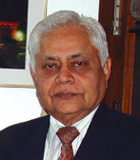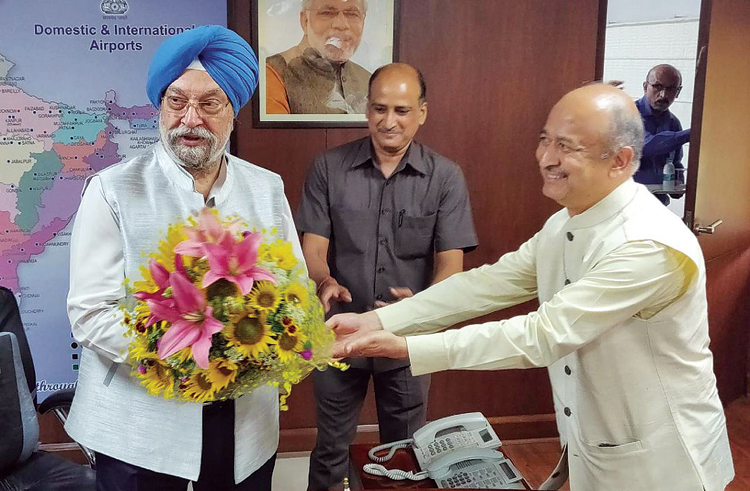Over Burdened and Under Powered
While no one can question the capability of Hardeep Singh Puri to head the civil aviation domain, given the importance of the Indian civil aviation sector to the economic well being of the nation, the least that the government could have done is to ensure that the Ministry is headed by a full fledged “Minister” and not by a “Minister of State”
 | By B.K. Pandey Editor, SP’s AirBuz |

In the elections at the national level held in April-May this year, the National Democratic Alliance (NDA) led by the Bharatiya Janata Party (BJP), won 353 seats out of the total of 543 in the Lok Sabha, with the Congress-led United Progressive Alliance (UPA) limited to merely 92 seats. The NDA, as also its leading constituent the BJP, which alone had assured majority having cornered 303 seats, were clearly buoyed with this resounding victory and lost no time in making public their list of incumbents heading different Ministries of the Central Government. Of particular interest to the industry dealing with Civil Aviation was the appointment of the individual to head the Ministry of Civil Aviation which in the first tenure of the NDA government was held by Suresh Prabhu as the Minister of Civil Aviation with Jayant Sinha placed under him as the Minister of State.
As per the new list of Ministers for the second term of the NDA government, released soon after the results of elections were made public, to head the Ministry of Civil Aviation, Hardeep Singh Puri has been appointed as the Minister of State of the Ministry of Civil Aviation with Independent Charge. Hardeep Singh Puri has been assigned two other responsibilities that of Minister of State (Independent Charge) of the Ministry of Housing and Urban Affairs as well as of the Minister of State in the Ministry of Commerce and Industry under Piyush Goyal. On the face of it, this appears to be a case of a single individual being over burdened with crucial responsibilities in three different Ministries.
Hardeep Singh Puri joined the Indian Foreign Service (IFS) in 1974 at the age of 22. During a career spanning 39 years, he served in senior positions at the Ministries of External Affairs and Defence. He has also held ambassadorial level posts in the United Kingdom, Brazil and served as Permanent Representative of India to the United Nations both in Geneva and New York. He had earlier served in Indian Missions in Tokyo and in Colombo during the operations of the Indian Peace Keeping Force. In the first term of the NDA government, he was inducted in the Union Cabinet on September 3, 2017 and took over as Minister of State (Independent Charge) of the Ministry of Housing and Urban Affairs. In the recent elections, he contested for the Amritsar parliamentary seat, but despite the Modi wave, lost to the candidate from the Congress Party. He was one of the few candidates from the BJP who lost in the Lok Sabha polls this time. This debacle has been attributed to the infighting within the BJP in Punjab and in no way reflects his capability to function as a Minister.
THE INDIAN CIVIL AVIATION INDUSTRY IS CURRENTLY THE NINTH LARGEST IN THE WORLD AND AS PER ANALYSTS, IS SLATED TO ATTAIN THE THIRD SLOT IN NOT TOO DISTANT A FUTURE
Of the responsibilities of the three Ministries of the Central Government entrusted to Hardeep Singh Puri, perhaps the most challenging one will be that as the Minister of State in the Ministry of Civil Aviation. What is of significance is that he is taking over the reins of the Ministry of Civil Aviation just when the Indian Airline industry is in a state of flux. One major airline in the private sector, Jet Airways, has failed and has shut down its operations. Its route to revival is yet unclear. The national carrier Air India is under a heavy burden of debt and has become a serious liability for the government. Efforts so far to disinvest or to sell the national carrier has not been successful. At the commencement of the second term, the NDA government once again stated its intention to put the national carrier on sale. With the experience so far, there is little doubt that privatising Air India will not be an easy task. It will be interesting to see how a bureaucrat-turned-politician handles this financially complex affair.

The Indian civil aviation industry is currently the ninth largest in the world and as per analysts, is slated to attain the third slot in not too distant a future. Also, this industry has been maintaining a double digit growth over the last four and a half years. However, given the uncertainties looming large over the horizon, maintaining a healthy rate of growth will be a major challenge for those at the helm of affairs in the industry as well as in the Ministry of Civil Aviation. To sustain or even further accelerate the momentum of growth of the Indian civil aviation industry, there is clearly the need for structural reforms in this sector that need to be undertaken with speed and clarity. There are clearly two issues that the government must address without delay for the Indian civil aviation industry to leapfrog. The first is to bring Aviation Turbine Fuel (ATF) under the Goods and Services Tax (GST) regime to substantially reduce operating costs for airlines as also for the smaller players in the domain of business and general aviation. The second is to review the tax structure in respect of the Maintenance Repair and Overhaul (MRO) sector. This segment of the Indian civil aviation industry is losing business to MRO facilities in the region on account of the unduly high taxes and import duty imposed. A number of MRO facilities in India have had to close down as they were unable to compete with foreign MROs on account of the high taxes imposed on this segment of the industry. Other areas that need the attention of the government are liberalisation and expansion of bilateral regimes and rapid expansion of airport infrastructure to provide a boost to the industry and especially the regional connectivity scheme.
While no one can question the capability of Hardeep Singh Puri to head the civil aviation domain, given the importance of the Indian civil aviation sector to the economic well being of the nation and its standing on the global scene with the capability to provide high speed connectivity to every part of the world, the least that the government could have done is to ensure that the Ministry of Civil Aviation is headed by a full fledged “Minister” and not by a “Minister of State”. Besides, if the Railways and Shipping can be headed by Ministers, there is no justification to lower the status of Indian Civil Aviation. Hopefully the government will make the necessary change and redefine Hardeep Singh Puri’s position as the Minister of Civil Aviation.





